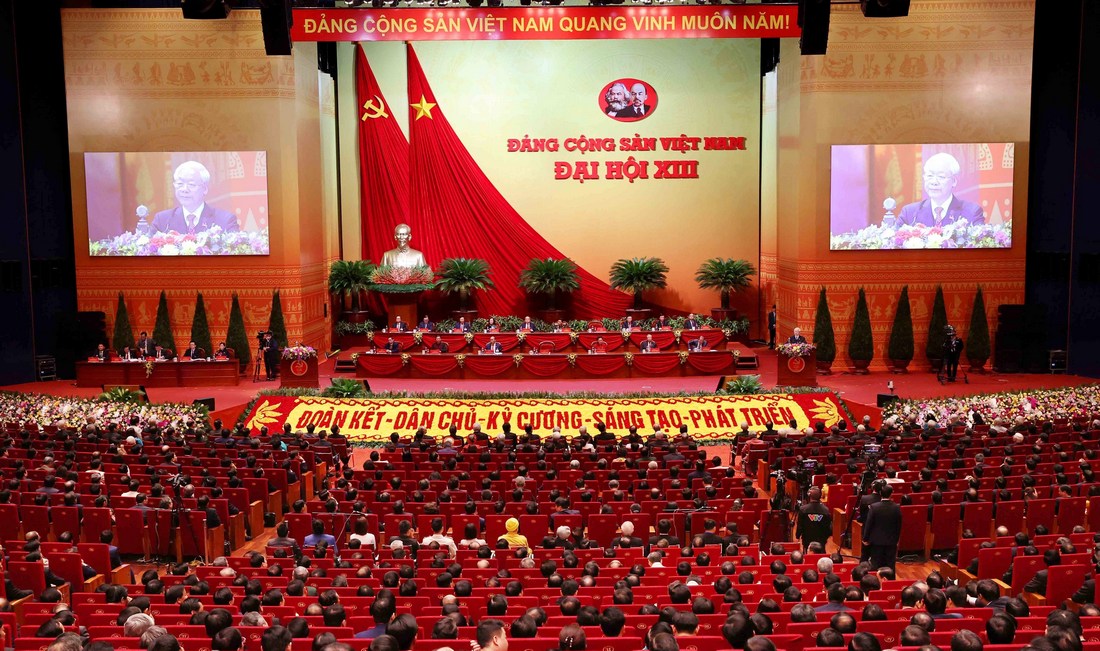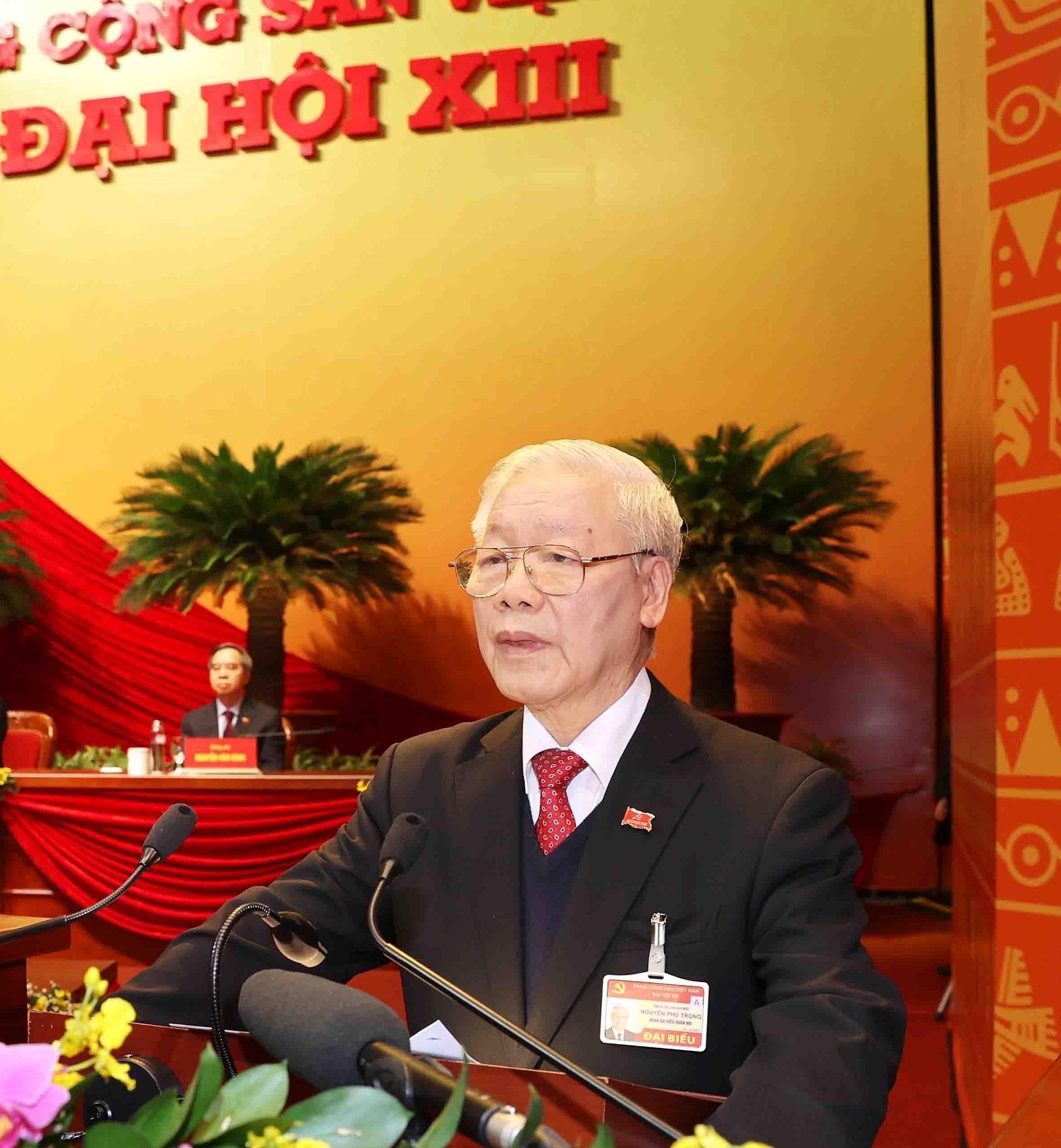
|
No. 4 |
February 14, 2021 |
|
CONTENTS Vietnam Enters the New Year on a Sound Footing • Successful
Webinar
Discusses the 13th Congress of the • Economy Continues to Grow Despite Global Pandemic • Forty
Years
of Impressive Economic Growth Vietnam Enters the New Year on a Sound Footing Successful Webinar Discusses the 13th Congress of the Communist Party of Vietnam |
|
|
The 13th National Congress of the Communist Party of Vietnam (CPV) took place in Hanoi from January 25 to February 1. The Congress engaged the people in a thorough review and summation of the work of the 12th Congress and in setting a concrete agenda of work to strengthen the economy, bring greater prosperity to the people, to defend peace and affirm Vietnam's sovereignty. The re-election of General Secretary Nguyen Phu Trong for a third term, at the first plenary of the 13th Central Committee which convened on January 31, expressed the confidence of the members of the 13th Central Committee and of the Party in his experienced and capable leadership.
The interest shown worldwide in the proceedings of the 13th Congress reflects the high esteem in which the CPV is held. As of January 30, the Congress had received 368 congratulatory messages and letters from 167 political parties, 18 Party organizations and organs of foreign parties and countries, six regional and international organizations, 130 political, social, friendship and people's organizations which include Vietnamese expatriates residing around the world, 26 foreign diplomatic representative missions in Vietnam and 21 individuals from 93 countries.
Proceedings
The opening communiqué issued January 26 set out the main theme of the 13th National Party Congress as follows: "Strengthening the building and rectification of the Party and the political system into purity and strength; rousing the will and determination for national development and promoting the strength of the great national unity bloc in combination with the power of the era; continuing to comprehensively and synchronously accelerate the cause of reform; constructing and firmly safeguarding the Fatherland and maintaining a peaceful and stable environment; and striving to turn Vietnam into a developed, socialist-oriented nation by the middle of the 21st century."
The 13th Congress conducted a thorough review of the implementation of the Resolution of the 12th National Party Congress held in 2016; the 35 years of work implementing the Doi Moi (Renewal) process; 20 years of implementing the 1991 Political Platform; and 10 years implementing the amended Political Platform and National Socio-economic Development Strategy 2011-2020.
Vietnam has made tremendous progress over these 35 years of implementing Doi Moi, but the CPV had concerns that the current growth drivers spurring industrial production, for example, have run their course and are becoming less effective in propping up growth. So too in a number of other sectors of the economy and without changes to the mind-set, institutional reforms and the allocation of state resources it would not be possible to maintain high and sustainable growth for the Vietnamese economy.
The Party press noted: "In order to look for new growth drivers in the years ahead, ministries, agencies and research organizations, both at home and abroad, have proposed many solutions, which put a particular emphasis on increasing the speed, scale and quality of restructuring programs, as well as pushing through state-owned enterprise reforms to re-allocate resources and move resources from ineffective to more efficient users."
"In the medium and long-term, the Vietnamese economy will grow on the two dynamics of the market and digital economies," the Party press pointed out. It described this as "a once-in-a-lifetime" opportunity "for Vietnam to take advantage of the fourth industrial revolution in order to catch up" with the other countries of the region. "Therefore it is necessary to formulate new proposals for the 2021-2030 period and beyond in order to ride the fourth industrial revolution in a substantive manner," it added.
As such, the 13th Congress work set out socio-economic development orientations and tasks for 2021-25; determining goals and orientations to 2030, a vision for national development to 2045, and a review of the Party-building work and of the leadership of the 12th Party Central Committee, and the election of a new Party Central Committee for the 13th tenure.
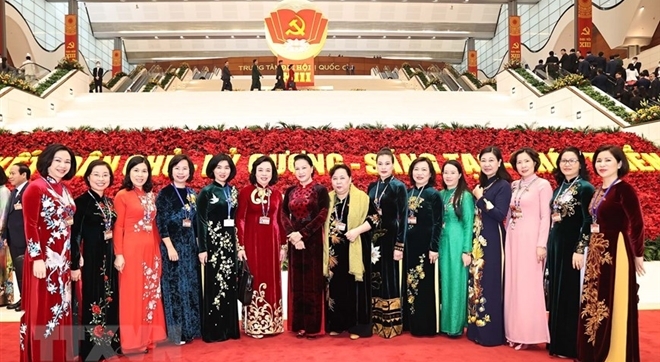
Women delegates from the Hanoi Party Committee at
the Congress.
A total of 1,587 delegates representing 5.1
million Party members participated in the Congress
to deliberate on reports prepared on these
matters. The delegates included 1,365 men (86.01
per cent) and 222 women (13.99 per cent), while
the number of ethnic minority delegates was 175
(11.03 per cent). Delegates were elected from
Party organizations at all levels. There were
delegates present from the Vietnam Fatherland
Front and other national organizations;
representatives of Heroic Vietnamese Mothers
(women who made outstanding contributions to
Vietnamese liberation and construction),
academics, artists and writers, religious
dignitaries and youth representatives as well as
dignitaries such as former Party Secretary General
Nong Duc Manh, along with former Politburo members
and former Presidents as well as former National
Assembly members and other guests of the Party.
The draft documents submitted to the 13th Congress were meticulously prepared and widely publicized to seek public opinion. Not just Party organizations at every level, but the entire country was engaged in consultation and discussion ahead of the Congress. Positive feedback was received from a large number of officials, party members and people both inside and outside the country. On that basis the central authorities synthesized and categorized more than 1,400 pages of comments and compiled a general report to the Congress of nearly 200 pages.
Opening of the Congress
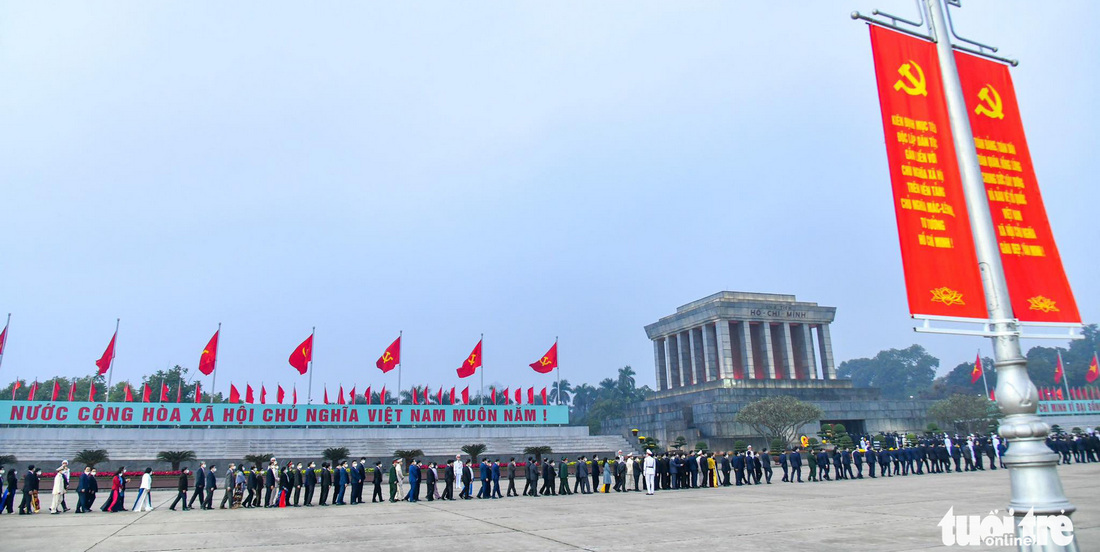
January 25, 2021. Congress delegates gather at the
Ho Chi Minh Mausoleum prior to the opening of the
Congress.
On January 25, prior to the official opening of the Congress, the delegates gathered at the Ho Chi Minh Mausoleum, to express their profound appreciation and gratitude to President Ho Chi Minh, the legendary leader of the Vietnamese people and architect of the Socialist Republic of Vietnam. They pledged to follow his revolutionary example and dedicate themselves to the well-being of the Vietnamese people and nation. They also laid a wreath at the Monument of Heroes and Fallen Soldiers. Delegates then participated in a preparatory session where they adopted the rules and protocols for the Congress, elected the Presidium, and approved the Congress's program of work.
Prime Minister and Member of the Politburo Nguyen Xuan Phuc, in his opening remarks to the first day of the Congress on January 26, told the delegates that the "13th National Congress of the Communist Party of Vietnam holds a great historical responsibility for the Fatherland, people and nation not only for the next five years, but also for the following decades and for future generations."
He noted as well that the Congress is being held at a time when the "entire Party, people and army have successfully implemented many guidelines, targets and tasks set in the Resolution of the 12th National Party Congress, contributing to great and significant achievements gained during 35 years of renewal." He also noted the need to address shortcomings and weaknesses in the next five years to achieve "a powerful and prosperous Vietnam by 2045."
"With the motto 'Solidarity -- Democracy -- Discipline -- Creativity -- Development,' the 13th National Party Congress shows the mettle, unyielding will and determination of the whole nation to advance forwards, for the goal of a prosperous people, a strong, democratic, equal and civilized nation," he added.
Report to the Congress
On the first day of the Congress, January 26, General Secretary Nguyen Phu Trong presented the Report of the 13th Congress based on draft documents that were drawn up after two years of consultation and involvement of the people at all levels -- "crystallized by the brainpower of the entire Party and people."
He pointed out that since 2018, the Party had organized 60 conferences, workshops and seminars to engage Party members, theoretical and scientific agencies, the Vietnam Fatherland Front as well as National Assembly deputies and other organizations in the summing up of the experience and proposals coming out of implementing the 12th Congress Resolution. The full texts of the drafts were published in the mass media to solicit the opinions of a wider spectrum of Party members and people both at home and abroad to ensure that their 13th Congress was a success. He noted that there were 80 revisions of the draft documents gathered from all sectors of Vietnamese society.
The General Secretary highlighted that in the last five years and in the context of 35 years of Doi Moi, despite challenges such as the COVID-19 pandemic and natural disasters, "the entire Party, people, and army have upheld a spirit of patriotism, solidarity, determination, mettle and creativity to work relentlessly and gain a number of very important and comprehensive achievements. Thanks to such efforts, the country has witnessed robust and sustainable growth with heightened trust among the people in the Party, state and socialist regime."
His report highlighted the 5.9 per cent annual economic growth, low inflation and strengthened financial position of the country, the country's positive trade balance, increased exports and the overall improved business climate.
General Secretary Nguyen Phu Trong emphasized that Vietnam's "political and social stability has been maintained while living standards of people have been improved, and progress has been seen in social welfare, health care, education and training, science and technology, environmental protection, culture, and human development during the period."
Party-building and the successful efforts to strengthen the Party ideologically, ethically and the training of personnel was an important theme addressed in the Report to the 13th Congress.
Party-building and rectification must be implemented profoundly, comprehensively, synchronously, regularly, and effectively in terms of politics, ideology, morality, organization, and personnel, General Secretary Nguyen said. He stressed the need to persistently pursue and creatively develop Marxism-Leninism and Ho Chi Minh Thought, and to raise the leadership and combat capacity of the Party.
He also mentioned tightening the close ties between the Party and the people, to consolidate and enhance the people's trust in the Party, the State, and socialism. People should be considered the "root" of all Party and State affairs, he said, underscoring the need to trust, respect, and promote people's right to mastery, and persistently follow the motto of "people know, discuss, do, inspect, supervise and benefit."
National Defence and Security
Another theme of significance addressed by the Congress was the Party's leadership in proactively consolidating and reinforcing national defence and security of the people. "The country's political, economic, cultural, and social affairs have been maintained alongside social order and safety. External affairs and international integration have been constantly expanded. The country has also demonstrated its firm and persistent determination in protecting national independence, sovereignty, unity, and territorial integrity, as well as the country's and the people's interests, while maintaining a peaceful and stable environment for national development and actively and responsibly contributing to global and regional peace, cooperation, and development. These efforts have been highly appreciated by the international community, constantly improving the Party and State's position as well as the country's stature and strength in the international arena," the Secretary General stated.
The 13th Congress determined that the Vietnamese People's Army (VPA) has been firmly maintained and upheld its nature and traditions as a heroic, united, proactive, and creative army. The VPA has exerted efforts to weather difficulties and challenges and comprehensively fulfil its duties, thereby serving to safeguard independence and sovereignty and maintain a peaceful and stable environment for national development.
The Congress resolved that the Party should continue its absolute and direct leadership over the VPA in every respect; build a regular, elite, and gradually modern army; and prioritize the modernization of certain military services, arms, and forces to create a solid prerequisite for building a modern army by 2030. The need to promote the building of people-based defence was also highlighted -- the association of people-based defence with people-based security. Also emphasized was the combination of ensuring strong defence -- security with economic affairs; the reform and improvement of military training, education, and science; the development of a self-reliant, resilient, modern, and dual-purpose defence industry; along with the promotion of substantive defence diplomacy in order to protect the country's interests early on and from afar, and by peaceful means.
The significance of Vietnam as a "bright spot" in containing the COVID-19 pandemic and managing to grow its economy was also noted by Secretary General Nguyen Phu Trong. He underscored that in the last year while the global economy has shrunk by an average of four per cent, Vietnam's economy grew by 2.91 per cent thanks to "its outstanding efforts." He stressed that the results achieved in the last five years have not only created "milestones" but have strengthened confidence and energized "the entire Party, people, and army to firmly overcome all difficulties and challenges and optimize the opportunities and advantages to bring the country into a new stage of development."
Resolution of 13th Congress
The 13th National Congress of the CPV wrapped up on February 1 after nearly eight working days, with its Resolution adopted at the closing session. On behalf of the Congress's presidium, National Assembly Chairwoman Nguyen Thi Kim Ngan chaired the closing session.
The Congress elected the 13th Central Committee of the CPV, whose 200 members include 180 official and 20 alternate members. The CPV's 13th Central Committee convened its first plenum on January 31 to elect a Politburo comprising 18 members. The plenum also re-elected Nguyen Phu Trong as General Secretary of the CPV's 13th Central Committee.
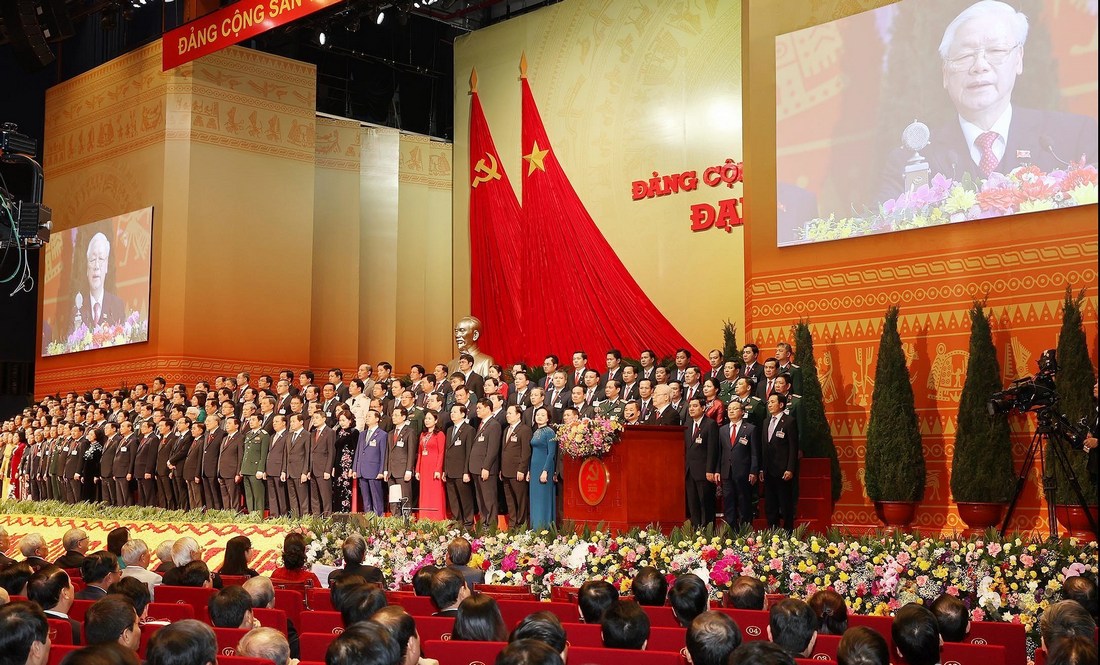
February 1, 2021. New Central Committee introduced
during closing session of the Congress.
On behalf of the CPV's 13th Central Committee, General Secretary and State President Nguyen Phu Trong thanked the Congress delegates for trusting and electing them to the supreme leading organ of the Party.
He emphasized that the 13th Central Committee of the CPV pledges to exert utmost efforts to surmount every difficulty to fulfil duties, uphold traditions and the already obtained revolutionary achievements, unite the entire Party and people to bring into play their glorious traditions and valuable experiences, enhance solidarity and unanimity, promote the consistency between thought and action, continually make self-improvement of revolutionary virtues and ethics to unceasingly strengthen their political mettle and work capacity, and determination to successfully implement the 13th National Party Congress's Resolution and meet the revolutionary cause's requirements in the new period along with aspirations of the entire Party, people, and army.
The Congress then adopted the Resolution. The Resolution states that the Congress agreed on the basic assessments of the implementation outcomes of the 12th National Party Congress's Resolution.
Delegates vote to adopt the Congress Resolution.
The Resolution said the achievements during the 35 years of Doi Moi and 30 years of implementing the 1991 Platform, especially the 10 years of the Platform supplemented and developed in 2011, have continued to affirm that the path to socialism in Vietnam matches the reality in the country and the development trend of the era, and that the Party's clear-sighted leadership is the leading factor determining the success of Vietnam's revolution.
Amid fast and complicated developments in the global situation, the Party's Platform remains "the flag of ideology, the flag of combat, the flag gathering the great national solidarity" with the aim of a prosperous people, strong nation and an equitable, democratic, and civilized nation.
The Resolution underlined the overall goals and concrete targets for 2025, 2030, and 2045; and identified major socio-economic development targets for 2021-25, orientation for national development for 2021-30, and the six key tasks for the 13th tenure of the CPV. It also highlighted three strategic breakthroughs.
Party General Secretary Nguyen Phu Trong then delivered the closing speech which reviewed the outstanding results and successes of the 13th National Party Congress. He noted that the Congress had stressed that the Party must enhance party-building and rectification work for a strong and pure party and political system, push ahead with increasing its mettle, leadership and ruling capacity in making and carrying out guidelines and policies in keeping with the reality in Vietnam and the development trend of the era.
The Congress also pointed to the need to take timely action to institutionalize, concretize, and effectively implement the Party's guidelines and the State's policies and laws, while addressing shortcomings in the leadership, direction, and organization of implementation.
In conclusion, General Secretary Nguyen Phu Trong said that the Congress asserted that the Party will persist in Marxism-Leninism and Ho Chi Minh's ideology, continually applying and developing them in a creative manner that matches the reality in Vietnam in each period. It will also keep steadfast in the aim of national independence and socialism, and the Doi Moi policy for the goals of a prosperous people, strong nation and an equitable, democratic, and civilized nation.
The Party and State leader appealed to the entire Party, people, and army, along with compatriots both at home and abroad to make all-out efforts to successfully carry out the 13th Congress's Resolution.
(Photos: VNA, Q. Minh)
Economy Continues to Grow Despite
Global Pandemic
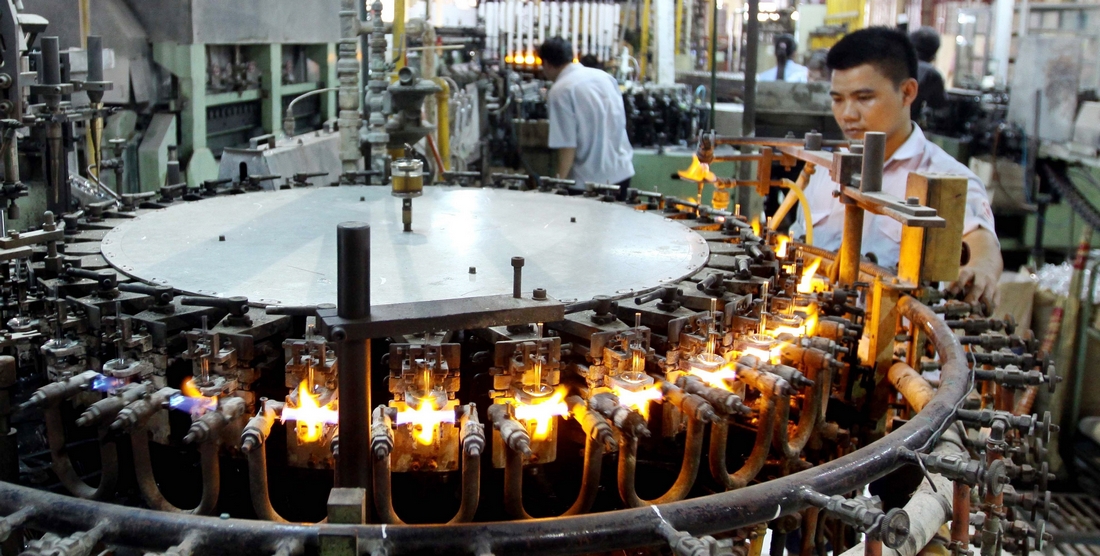
Industrial production stepped up.
Faced with the closure or reduction of many global markets because of the international health emergency and economic crisis, Vietnam took measures to develop its domestic economy comprised of more than 97 million people. The Vietnam News Agency interviewed the Vietnam Minister of Industry and Trade Tran Tuan Anh on what was accomplished during the difficult year 2020.
The Minister said the government made every effort to develop the national economy in response to the "new normal" of disrupted global supply chains. It introduced a wide range of stimulus programs "to encourage demand for domestic products and services," which proved effective in boosting revenue from the circulation of goods and sale of services across the nation. This included facilitating the distribution in urban areas of rural products and the building of infrastructure. This could be seen with the continuing addition of new retail stores. In the ten-year period to the end of 2020, almost 7,000 new supermarkets and 140 new shopping malls and thousands of new convenience stores in the bigger cities have been added to the retail sector.
Local companies, both government-owned enterprises and private ones, stepped up their production and business activities greatly contributing to positive growth of the nation's economy during the past year. The Minister added that this was only possible because the government mobilized the people to engage in a "swift and effective response to the pandemic." As of February 12, Vietnam continues to have one of the best records to this point in keeping the COVID-19 virus at bay with 2,142 total cases and 35 deaths so far for the entire country. While combating the pandemic, Vietnam was also one of the few countries to experience positive growth in the economy with GDP increasing almost three per cent in 2020.
Government Announces Measures to Build Economy

Design for National Innovation Centre.
The Vietnamese government has promulgated two resolutions "to promote socio-economic development and enhance national competitiveness in 2021 respectively." Speaking at a press conference on January 4, Mai Tien Dung, Chairman of the Government Office, said the goal was to expand the economy 6.5 per cent in 2021.
The government outlined 96 specific targets on which ministries, agencies and localities must formulate their own plans and evaluate their success. The resolutions emphasize "efforts to support people and enterprises to revive production and business activities negatively affected by COVID-19."
In related news, the Prime Minister of the Socialist Republic of Vietnam, Nguyen Xuan Phuc, on January 5 issued the National Strategy on the Fourth Industrial Revolution to be achieved by 2030.
The strategy's objectives, as reviewed by the newspaper Nhan Dan, the Central Organ of the Communist Party of Vietnam, "are to take full advantage of opportunities presented by the Fourth Industrial Revolution; fundamentally master and widely apply new advanced technologies in different social and economic aspects; gradually develop new technologies in support of renewing Vietnam's growth model and promoting economic restructuring in tandem with the implementation of strategic breakthroughs and national modernization; and accelerate growth of the digital economy.
"The strategy also aims for the country's robust and sustainable development based on science-technology, innovation and high-quality human resources; improvement in life quality, social welfare and people's well-being; firm safeguarding of national defence and security and protection of the environment and eco-system; enhancement of international integration effectiveness and use of high technology in ensuring cyber security."
The National Strategy aims for the digital economy to become 30 per cent of the Gross Domestic Product; to expand productivity annually by 7.5 per cent; to reach the goal of countrywide universal access to fibre-optic Internet and 5G services; and, according to Nhan Dan, accomplish "the completion of digital government development, and the establishment of smart cities in key economic zones across the north, central and southern regions which will be connected with the regional and global networks of smart cities."
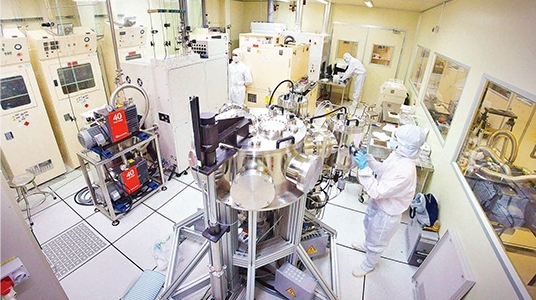
Modern nano technology lab in Ho Chi Minh City.
Nhan Dan writes, "To this end, Vietnam
plans to further accelerate development of
infrastructure, database, and human resources;
build e-Government towards a digital government;
enhance national innovative capacity; develop a
number of priority technologies for the active
engagement in the Fourth Industrial Revolution
such as robotics, advanced materials, renewable
energy, artificial intelligence (AI), the Internet
of Things (IoT), big data and blockchain. The
country will also expand international cooperation
and integration in science and technology."
The strategy envisions stepping up "the development of high-speed Internet services and secured digital infrastructure to meet demand for big data connection and processing; the application of digital technology in State governance and delivery of public services in all areas; and building of the real-time information system to support the Government's governance and administration."
(Nhan Dan. Photos: VNA, NDO, baodautu.vn)
Forty Years of Impressive Economic Growth
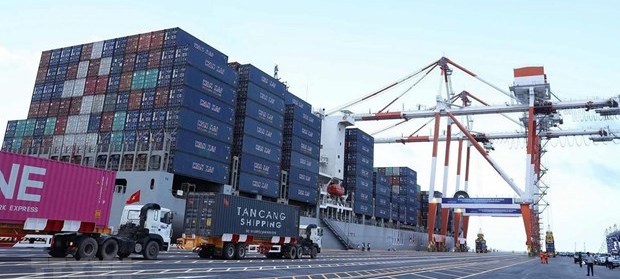
Hai Phong International Container Terminal.
The U.S. imperialists during their war of aggression to conquer Vietnam caused horrendous destruction to the people and their economy. Since the U.S. military was defeated and forced to leave in 1975, the people of Vietnam and their leadership have made remarkable advances in overcoming difficulties to rebuild the country and economy to achieve today what they term as "moderate prosperity." Pursuing a line of independence and determination to become a modern developed economy with a scientific industrial base of mass production, they have given rise to significant changes to improve the productivity of the working class and peasantry and increase the living standards of all.
According to Nhan Dan, Central Organ of the Communist Party of Vietnam, and the Vietnam News Agency the economic achievements have been impressive indeed.
During the period from 1986 to 1990 after the initial trauma and destruction of the U.S. war of aggression had been overcome, annual GDP growth began to average 4.4 per cent. From that initial growth in developing the industrial base and productivity of the working class and peasantry, the GDP figure improved to seven per cent annual growth from 1996 to 2000.
In recent years, while sustaining high annual economic growth, emphasis has shifted to the quality of development. The efforts resulted in Vietnam managing in 2020 "to sustain a growth rate of nearly three per cent despite the tremendous negative impacts of the COVID-19 pandemic, making it one of the few economies with positive growth in the world," according to Nhan Dan.
Nhan Dan continues, "The size of the economy has grown substantially to about U.S.$262 billion in 2019, an 18-fold increase compared with 1986 [...], while the income per capita reached U.S.$2,800, standing among the middle-income countries. Labour productivity also rose from an annual average of 4.3 per cent during the 2011-2015 period to 5.8 per cent during the 2016-2020 period. The contribution of total factor productivity in the past five years was estimated at 45.2 per cent, compared with the target of 30-35 per cent."[1]
The overall makeup of the economy is shifting from a rural agricultural one with heavy reliance on manual labour to a more industrial urban base of mass production using sophisticated machinery employing educated workers.
Careful regulation of the supply of the Vietnamese currency in circulation has kept annual inflation to around four per cent during the 2016-2020 period. In this a big effort was required with its international trade and the foreign currency market to reduce "dollarization" of the economy. This has resulted in an increase in foreign currency reserves of social wealth, and enhanced international confidence in the domestic currency, the Vietnamese Dong.
Nhan Dan reports, "The national infrastructure system has been greatly modernized, especially transport infrastructure. [...] Domestic consumption and investment continue to be two important pillars of the economy. Total retail and services revenue has grown continually, averaging 12.8 per cent during the 2011-2014 period. With the development of technology, the retail market is shifting from traditional to modern channels. Retailers have quickly adapted to changes in consumers' behaviour and taste, with online shopping increasingly favoured. The mobilization of resources for development investment has been promoted, with total development investment increasing by 10.6 per cent on average during the 2011-2020 period." Improvements in availability of credit have also been an important factor in providing additional investment for the economy.
Nhan Dan says that social wealth from the state budget and through issuing government bonds has mainly been spent on key socio-economic infrastructure projects. These state investments account for 20.8 per cent of total social investment. Investment from the non-state sector increased rapidly from 36 per cent in 2010 to 46 per cent 10 years later. Foreign direct investment has also played a role in modernizing the economy with large-scale high-tech projects.
Vietnam's integration into the world market of trade and commerce has meant the negotiation and completion of many bilateral and multilateral trade agreements. This past November Vietnam hosted the virtual summit of the Association of Southeast Asian Nations at which a Regional Comprehensive Economic Partnership was signed on the sidelines. This economic partnership is the largest in the world and includes not only the 10 members of ASEAN but also five others covering 2.2 billion people. The countries signing the agreement include the 10 member states of ASEAN; Vietnam, Thailand, the Philippines, Laos, Cambodia, Myanmar, Malaysia, Singapore, Indonesia and Brunei -- along with Australia, China, Japan, New Zealand and south Korea.
Nhan Dan reports, "International economic integration has strongly bolstered Vietnam's international trade. From a country with a large trade deficit, Vietnam has managed to reach a trade balance, and even register a trade surplus." It says the international agreements have helped Vietnam "diversify its external economic relations, thus reducing reliance on a single market. Vietnam is currently exporting its goods to more than 200 countries and territories."
Nhan Dan writes, "Despite the impact of COVID-19, Vietnam still posted a record trade surplus of U.S.$20.1 billion in the first 11 months of 2020."
It continues, "The world in the early 21st
century has seen many rapid changes and
international relations are becoming increasingly
complicated and unclear. The COVID-19 pandemic,
climate change, extreme weather and severe natural
disasters in 2020 have reinforced the above trend.
No rigid and standard system of solutions can be
effective for the country's socio-economic
management. Being aware of this, the Party and
State have determined that better mechanisms are
needed to increase economic resilience to shocks.
"Vietnam has proactively built a modern economic structure, created the foundation and room for macroeconomic policy implementation, gradually mastered advanced production technology, improved the position of enterprises and the economy in global value chains, and diversified markets and trade partners.
"It can be seen that with each challenge faced, the Vietnamese economy can teach itself, test the effect of policies on life, the relationship between theory and reality in order to learn a lesson for the next stage. The culture of learning from macroeconomic policy implementation will help Vietnam to always be prepared for new uncertain circumstances."
Note
1. Labour productivity is generally defined as the number of standard work hours required to produce a certain quality and quantity of goods or services. Less work-time required to produce a similar quality and quantity of social product is considered a gain in productivity. Productivity growth generally means more fixed and circulating value from machinery and material is used in production compared with the standard work-time required from active workers. Productivity can also increase from better organization and training of the workers involved in production.
Total factor productivity is a measure of productivity calculated by dividing the economy-wide total production, usually measured as Gross Domestic Product, by the weighted average of the amount of standard work-time and fixed and circulating value (machines and material) that went into production of the GDP or total social product. The growth of actual output of social product, not its value in standard work-time, versus the inputs of standard work-time and fixed and circulating value represents a real growth in total factor productivity. (More food and other goods and services using less standard work-time.) This generally results from improvements in the application of science and technology to production, using fewer but better trained, educated and organized workers and improved more efficient machinery and equipment etc.
(With files from Vietnam News Agency and Nhan Dan. Photo: VNA)
Videos
(To access articles individually click on the black headline.)
Website: www.cpcml.ca Email: editor@cpcml.ca




